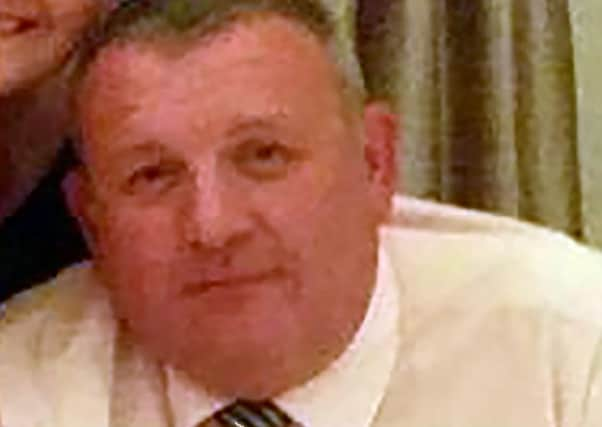Adrian Ismay murder trial: Brother of accused refuses to answer questions


Christopher Robinson is accused of murdering prison officer Adrian Ismay, 52, who died in March 2016, 11 days after a bomb exploded under his van close to his east Belfast home.
The accused’s brother Peter Robinson was due to give evidence earlier in the murder trial, but failed to attend citing medical reasons. This prompted Mr Justice McAlinden to order that he attend, or an arrest warrant would be issued.
Advertisement
Hide AdAdvertisement
Hide AdAt the time of the murder, Peter Robinson worked at a youth hostel in west Belfast and was due to answer questions about claims he disabled the CCTV system the night before the bomb exploded and told a colleague ‘our Christy is calling’.
It is the Crown’s case that a red Citroen C3 containing the bomb was driven by Christopher Robinson to Mr Ismay’s Hillsborough Drive home – the same make and model Peter Robinson drove to work hours before the device exploded.
Christopher Alphonson Robinson, 48, from Aspen Park in Poleglass, denies charges of murdering Mr Ismay, possessing an improvised explosive device and providing money or property for the purposes of terrorism.
Just before Peter Robinson was called to the witness box, his barrister Martin O’Rourke QC revealed that in the aftermath of the murder, his client was arrested and questioned and was therefore a suspect.
Advertisement
Hide AdAdvertisement
Hide AdMr O’Rourke said that over a five-day period in March 2016, Peter Robinson was interviewed 13 times under caution. He was rearrested in February 2017, and on this occasion he was interviewed six times.
The barrister said Peter Robinson “refused to answer any questions other than to state his name and address” and revealed he “provided to the police a pre-prepared statement through his solicitor”.
Mr O’Rourke said the questions put to Mr Robinson during these interviews included:
• lending his vehicle, which the Crown allege was involved in the murder;
Advertisement
Hide AdAdvertisement
Hide Ad• the turning off of CCTV at the hostel when the car was ‘borrowed’ and ‘returned’;
• the deletion of text messages between him and ‘another person’;
• the removal of ‘relevant evidence’ from the car.
Mr O’Rourke said that as his client was questioned about being compliant and as a suspect, it was his right not to incriminate himself and could therefore invoke the privilege not to answer questions as a witness.
Peter Robinson was then called to give evidence at Belfast Crown Court, and after swearing on the Bible, he was advised of his right not to incriminate himself by Mr Justice McAlinden.
Advertisement
Hide AdAdvertisement
Hide AdThe judge told the witness that if there was a question asked that ran the risk of prosecution, or increased the risk of prosecution, he had a right not to answer that question.
A Crown barrister then posed a series of questions to Mr Robinson, none of which he answered.
The first question he was asked was “did you make and sign a prepared statement in the course of your interviews with police in respect of these proceedings”. He replied: “I am going to decline answering on the basis of not incriminating myself.”
Mr Robinson was then asked “did you tell the truth in that statement?” to which he responded “I will decline to answer for the same reasons”.
Advertisement
Hide AdAdvertisement
Hide AdWhen he was asked by the Crown barrister if there was “any reason why you do not wish to answer my questions?”, the witness said: “I am going to decline to answer for the same reasons.”
The fourth and final question posed by the Crown to Mr Robinson was “aside from risk, would you otherwise wish to give evidence?”, to which he said “I decline to answer for the same reason”.
The prosecutor said he had no further questions, and said the Crown intended to rely on the statement given to police.